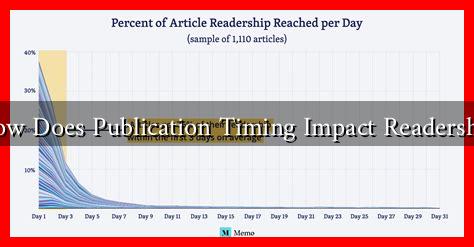-
Table of Contents
How Does Publication Timing Impact Readership?
In the fast-paced world of digital media, the timing of a publication can significantly influence its readership. Whether it’s a blog post, a news article, or a research paper, the moment a piece is released can determine its visibility, engagement, and overall impact. This article explores the various factors that contribute to the importance of publication timing and offers insights into how content creators can optimize their release schedules for maximum readership.
The Science of Timing
Research has shown that timing can affect how content is consumed. According to a study by CoSchedule, the best times to post on social media platforms can vary widely, but certain patterns emerge. For instance, posts made on weekdays tend to receive more engagement than those made on weekends. Understanding these patterns can help content creators strategically plan their publication schedules.
Factors Influencing Publication Timing
Several factors can influence the optimal timing for publication:
- Audience Behavior: Knowing when your target audience is most active online is crucial. For example, a study by Sprout Social found that the best times to post on Facebook are Wednesday at 11 a.m. and Friday from 10 a.m. to 11 a.m.
- Industry Trends: Certain industries have peak times for content consumption. For instance, financial news may see higher readership during market hours, while lifestyle blogs may perform better in the evenings or weekends.
- Current Events: Timing a publication to coincide with relevant news can enhance visibility. For example, a health blog might gain traction by publishing articles related to a recent health crisis or awareness month.
- Seasonality: Some topics are inherently seasonal. For instance, articles about holiday shopping should be published well in advance of the holiday season to capture interest.
Case Studies: Timing in Action
Several organizations have successfully leveraged publication timing to boost readership:
- The New York Times: The Times often publishes articles in the early morning to capture readers during their morning commutes. This strategy has proven effective in increasing readership for their daily news summaries.
- BuzzFeed: Known for its viral content, BuzzFeed strategically releases quizzes and listicles during peak social media hours, maximizing shares and engagement.
- Academic Journals: Many academic journals have specific release schedules that align with academic conferences or events, ensuring that their research reaches the right audience at the right time.
Statistics on Readership and Timing
Statistics further illustrate the impact of timing on readership:
- A study by HubSpot found that blog posts published on Mondays and Thursdays receive the most traffic.
- According to a report by Buffer, tweets posted between 12 p.m. and 3 p.m. receive 23% more engagement than those posted at other times.
- Research from the Pew Research Center indicates that news articles published during breaking news events see a significant spike in readership, often doubling or tripling the usual traffic.
Strategies for Optimizing Publication Timing
To maximize readership, content creators can implement several strategies:
- Analyze Audience Insights: Use analytics tools to understand when your audience is most active and tailor your publication schedule accordingly.
- Stay Informed on Trends: Keep an eye on industry trends and current events to time your publications for maximum relevance.
- Experiment with Timing: Test different publication times and analyze the results to find the optimal schedule for your content.
- Utilize Social Media: Promote your content on social media at strategic times to increase visibility and engagement.
Conclusion
Publication timing is a critical factor that can significantly impact readership. By understanding audience behavior, industry trends, and the importance of current events, content creators can optimize their release schedules for maximum engagement. As demonstrated through various case studies and statistics, the right timing can lead to increased visibility and readership, ultimately enhancing the impact of the content. In a world where attention spans are short and competition is fierce, mastering the art of timing can be the key to successful content dissemination.
For further insights on optimizing your content strategy, consider exploring resources like HubSpot’s Marketing Blog for tips and best practices.

